Sir Paul McCartney: 'Retire from what?'
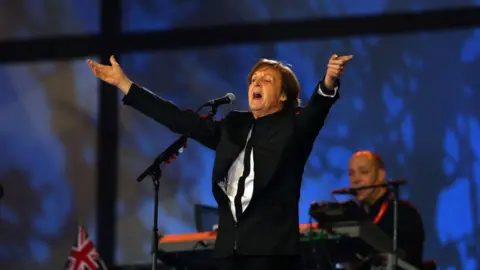 Getty Images
Getty Images"This is it - the actual one!" Sir Paul McCartney is holding the double bass that belonged to Elvis Presley's original bassist Bill Black.
It's leaning in the corner of his office, above his recording studio in deepest East Sussex.
"Just imagine," he enthuses like a teenage fan "This was here…" he gestures a couple of feet to his left, "… and Elvis stood here!"
He picks it up and starts plucking and singing Heartbreak Hotel. He rests it back on its stand and smiles: "I'd like to think one day this will be in a museum with my little Hofner bass next to it."
It's clear Sir Paul is aware of his standing as the world's most successful and famous musician, but seemingly carries the weight effortlessly.
He's open, funny, cheerily self-analytical and enthusiastic, especially about releasing his first new album in four years, Egypt Station. The first single to be taken from it is the double A-sided Come On To Me and I Don't Know
Sir Paul spoke to Matt Everitt on BBC 6 Music about his new material.
I Don't Know opens with the lyric, "Crows at my window, dogs at my door, I don't think I can take it anymore". This imagery does seem pretty bleak for a comeback.
Well, I was in a bleak mood. It's a well-known fact, you talk to a lot of songwriters, that they write good songs from being in a bad mood.
It can often be a really good motivating factor, because you don't care. You can't just go out to your friends or your relatives, and just start going, 'I've got crows on my window.'
You don't necessarily want to just go and complain about everything, but you can complain to your piano, in this case, or your guitar... It's a great therapy."
Doubt and regret don't seem to be things that people associate with you.
It's funny, isn't it? People think that about me, that well, when you reach my position... you end up with no problems at all.
But that's unrealistic, because you're in life. And if like me you've got a big family, there's gonna be some sort of problem, even if it's just someone's ill.
So realistically speaking, you have to think that it's very likely that most people you know can have problems. Even President Obama. Even John Lennon. Even Taylor Swift. We've all got problems, and that's what makes us all so human.
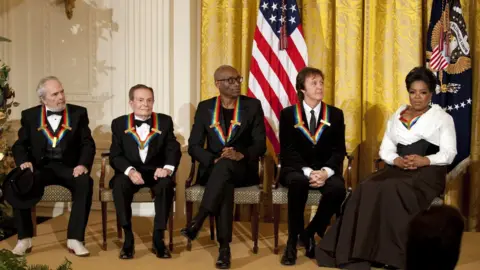 Getty Images
Getty ImagesAnd in a way it's a good thing. I don't think I'd want to just be living in some big fairytale castle, away from the realities of the world. Obviously when you're in a problem, it's annoying. But you're in the real world, and that's a good thing.
Do you have a critical voice when you're writing a song?
Yeah, definitely. You hope you have that. It's a good thing to have, because otherwise you're just gonna write songs you've written, or even worse, that other people have written. So you do self-govern as you're going along.
You just think, 'That's a bit corny.' Sometimes I'll go right through it, but I'll remember that little bit that was corny and I'll go back to it. But I might just motor on to get the song done. Then I'll go back and think 'That was a lousy line.' Spend a bit of time on that line and think, 'Oh yeah. Much better way to say.' But often, they just fall out, if you're lucky.
I was just wondering how tough you are on yourself. Because you've had 55 years of people saying you're great.
Yeah.
Does that mean the voice has to be a bit more, 'No you're not, come on.'
No, you're right. The great thing about the fact that you've been so successful for so long, comes the not-so-great thing, which is that at some point, you're just gonna get big-headed. And you are just gonna think, 'I am pretty hot.' And I think you've got to watch out for that. You gotta hope that you're spotting that, as you're doing it.
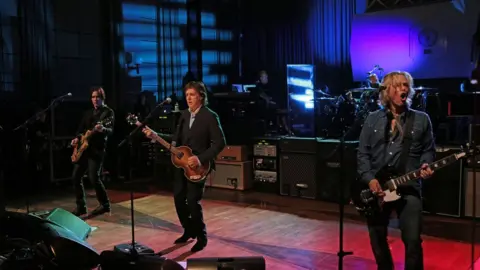
So yeah, if songs don't just lay themselves out, then I will be quite strict, and think, 'No, this is really lousy. I hate that bit of melody. I've gotta change it.' And so then I will just work harder on it, come back to it, and spend some time, and try and fix it. And if I fix it, that's fine, and then we go and record it. If I don't, that's not fine, and it gets chucked.
Because I think, well, everybody changes as they go through their life, and musicians and artists change creatively. I think, as one gets on in one's life, one can become more melancholic or one can become more optimistic or more sentimental, or more angry about the world. Where do you think you are, now? How have you changed?
Yeah, I think I'm always trying to be optimistic, and I am always pretty optimistic, because there's an expression somebody said to me once. 'I'm an old man with many worries, most of which never happen.' And I think that can be very true. We do worry about things. And I'll often say this to someone who's worrying about, so I'll say, 'Don't worry about it. It's probably not gonna happen. It'll be okay.'
And so yeah, I'm somewhere in the middle. I am optimistic, but I'm a realist, so I try and keep this check on me that just doesn't allow myself to get carried away with 'Oh! It's just all roses and sunshine!'
Because I know it's gonna rain, I know the winter's coming round, and I know about that stuff enough for me to keep a check on myself and just think, 'Look, just land somewhere in the middle of all of this and you'll be okay.'
What gets your back up? You were at the pro gun control march…
Yeah, I just think America's got itself in a crazy position. In the old days when the constitution was written, it said the right to bear arms, because, I don't know, the British were coming, so let's give every man a musket, and allow him to use it. Then, I think it made sense.
But as time's gone by, I think it should have been adjusted. Musket, yeah. If you fire one shot, then you gotta load, and maybe give you time to think about firing the second shot.
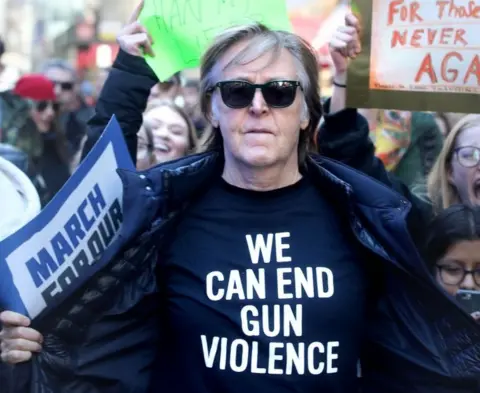 Getty Images
Getty ImagesBut with the assault rifles, it's just got to a ridiculous stage. And with the strength of the NRA, they have so much money, and their attitude is so powerful, that you could see when Trump was campaigning, that he would just say, 'They're gonna take your guns away from you.' And that is powerful, to Americans.
So I think all of that's catching up with America, and I really don't know how they're gonna do it. That's what I think is the biggest problem. I'd love to see gun control. The greatest hope I think, is the kids. The kids from all these shootings, who were at this rally that we went to in New York. And it was so powerful. They were so powerful. You really did think, 'If anyone's gonna change it, it's gonna be them.'
How ambitious are you, these days? Because when bands start, you'll look at the other band on the bill and go, 'I'm gonna beat them. That song! I wish I'd written that.' Do you still do that? Do you watch, say, The Foo Fighters, and think, 'I wish I had written that one.'
No, I don't watch them. I know we're better than them [laughs]. Sorry, Dave. Yeah, I look around, and see who's doing what, and then sometimes you go, 'Yeah, I love that. I love the way he or she sings that.' Or, 'Wow, that's a great little record.' I don't get madly jealous.
I listen to people, and I think there's a lot of good stuff going on, myself. But no, a lot of people my generation will say, 'Oh, music's not as good as it used to be.' But I always say, 'No, that's what our parents said.'
 Getty Images
Getty ImagesLike when I worked with Kanye [West], and that was great, just seeing how that came together and listening to it, I thought, 'It's great. I love it.' Okay, so I contributed to it, so I would love it, but the bits I wasn't on, I really thought were very cool. And I could see the value of it.
So yeah, I listen, look at other people. And I'm intrigued by how they do it. So working with Kanye was quite an experience, something I'd never done before. But it was great. Four Five Seconds came out of it. I didn't even know I was making a Rihanna record! And then suddenly, it arrives. And I had to ask people, I'd say, 'Am I on this? Did I do anything with this?'
Surely somebody told you!
No! It arrived out of the blue and what had happened was, I'd played a guitar thing. The whole backing of four or five seconds is a guitar riff thing that I played. But I played it in A, down quite low and quite slow. And then for benefit of the record, and probably for Rihanna's vocal key, they lifted it, they sped it up.
Are you are gonna go out and tour this new album?
Yeah.
When?
Well, okay, we're just planning it now. And we definitely know we're out in September, and beyond. Because you've gotta book those now, kind of thing. And I know we're playing Austin City Limits, which is in October. I think that's been announced. Or did I just announce it? That's the only thing that's been announced, yeah. So we're playing that.
And then, before then, before August, we might just do a couple of little gigs, just because they're fun. We once played The Hundred Club, we once played The Cavern, and those little gigs, they're really nice to do.
And it not only takes you back to where you started, but there's the intimacy in the audience, and you can have a lot of fun. And you sometimes don't feel like it's quite so precious. Because if there's 40,000 people who paid all that money, you've gotta think about pleasing them. If there's only a couple hundred, and we're all having a party, you just think, 'We can throw in 'Matchbox,' or we'll throw in an odd number that we'd only do at sound checks or something. So they're good fun for that reason.
Elton John's announced this is the final tour that he's gonna do...
I'm like these footballers. People say, 'When are you gonna retire?' And they will nearly always say, 'Well, when I don't enjoy it, or when the legs give in,' or something like that. When there's a factor, that makes them retire. I don't think any of them want to retire particularly.
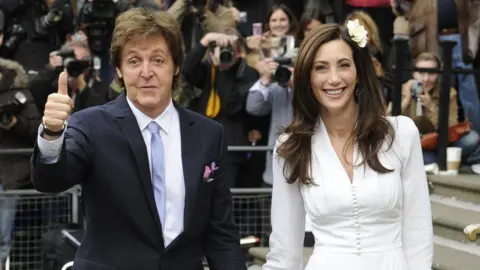 Getty Images
Getty ImagesAnd I was talking to - name-dropping, clunk - Willie Nelson, and I was talking about this whole retiring thing, because he's older than I am, even. And he says, 'Retire from what?' And I think that just says it. Retire from what?
Paul McCartney's new album 'Egypt Station' is on 7th September via Capitol Records and the full interview will be broadcast on the BBC 6 Music Breakfast Show at 08.30 BST on Thursday 21 June.
